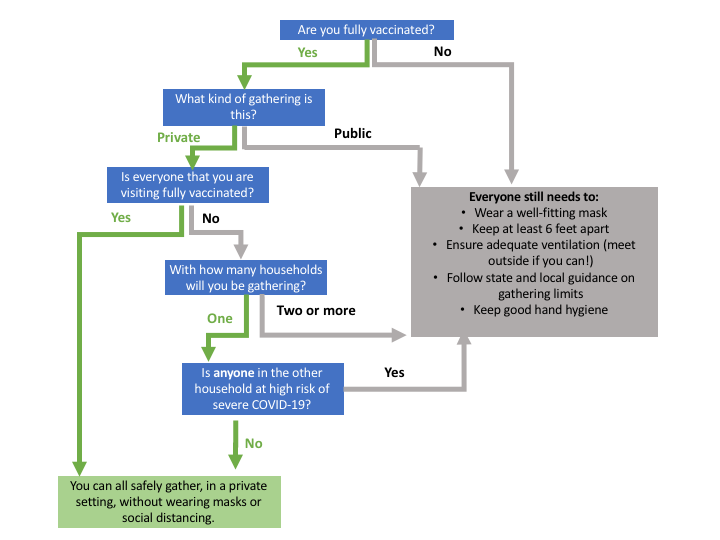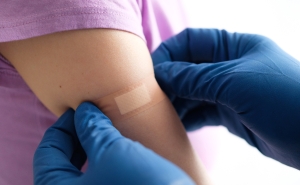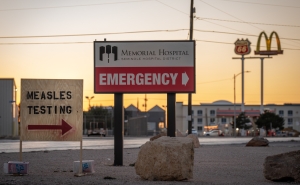What You Need to Know About the CDC’s COVID-19 Guidance for Fully Vaccinated Individuals
Vaccinated people are well protected, but they need to be respectful of others still at risk

The CDC recently updated its guidance for individuals who have been fully vaccinated with a COVID-19 vaccine available under Emergency Use Authorization by the FDA.
This guidance pertains to masking, physical distancing, exposure, and testing.
What does a “fully vaccinated individual” mean?
A person is considered to be “fully vaccinated” after at least two weeks past their second dose of the Moderna or Pfizer/BioNTech vaccine, or at least two weeks after their single dose of the Johnson & Johnson vaccine. This two-week period gives the body time to establish a strong immune response after the second dose.
What does the guidance mean for fully vaccinated individuals in public gatherings or settings?
In any setting, fully vaccinated people no longer need to wear a mask or physically distance—except where required by federal, state, local, tribal, or territorial laws, rules, and regulations including businesses and workplace guidance.
What does the guidance mean for fully vaccinated individuals visiting with unvaccinated people?
New data shows that COVID-19 vaccines are highly effective at protecting vaccinated people against symptomatic and severe COVID-19. There’s also growing evidence that vaccinated people are less likely to have asymptomatic infection or transmit SARS-CoV-2 to others.
This means that fully vaccinated people visiting with unvaccinated people in a private setting do not have to wear masks or social distance if all unvaccinated people in the other household are at low risk of severe COVID-19.
If anyone in the other household is at high risk of severe COVID-19 and has not been vaccinated, then everyone—including the fully vaccinated individual(s)—should continue to wear masks, social distance, and wash hands.
What does the guidance mean for families with unvaccinated children?
Fully vaccinated individuals can visit without masks and without social distancing with a single household, including unvaccinated children, if everyone in that household is healthy and at low risk of severe COVID-19. (The CDC guidance does not mention two households visiting, both with children, if the adults are fully vaccinated.)
What does the guidance mean for larger gatherings like concerts and weddings?
The CDC states that both indoor and outdoor activities pose minimal risk to fully vaccinated people, and that there’s a reduced risk of vaccinated people transmitting SARS-CoV-2 to unvaccinated people.
Fully vaccinated people can resume activities without mask wearing or physical distancing, except where required, in all instances.
The CDC does still recommend that unvaccinated people—including children—continue to practice prevention measures like masking, hand washing, and physical distancing.
What if a fully vaccinated individual is exposed to a known COVID-19 case?
A fully vaccinated person does not need to quarantine or be tested for SARS-CoV-2 if exposed.
However, fully vaccinated people should still get tested if they experience COVID-19 symptoms. If they have symptoms and/or have tested positive, they should isolate themselves from others for 10 days.
If a fully vaccinated person lives in a congregate setting (like a group home or correctional facility) and is exposed to a COVID-19 case, they should quarantine for 14 days.
I’ve been fully vaccinated—can I travel domestically?
The CDC states that fully vaccinated travelers can resume domestic travel without the need for testing before or after, unless testing is required by local law, employers, etc. Vaccinated travelers also do not need to quarantine following domestic travel.
Domestic travelers should still wear masks on planes, buses, trains, and all other forms of public transportation and in airports and stations.
People who are not vaccinated should read the full CDC guidelines for domestic travel.
What about international travel?
Fully vaccinated people can travel internationally, but they will need to follow all airline and destination requirements related to travel, mask wearing, testing, or quarantine which may differ from US requirements.
All passengers coming into the US, including citizens and fully vaccinated people, are required to have a negative COVID test result no more than three days before travel or documentation of recovery from COVID-19 in the past three months before they board a flight to the US.
People who are not fully vaccinated should read the full CDC guidelines for international travel.
I haven’t been vaccinated yet—what does the guidance mean for me?
You should continue to follow CDC guidance: Wear a mask, social distance, wash your hands, and avoid crowded settings.

Rachel West, PhD, is a former postdoctoral associate at the Johns Hopkins Center for Health Security and the W. Harry Feinstone Department of Molecular Microbiology and Immunology at Johns Hopkins Bloomberg School of Public Health.
Gigi Gronvall, PhD, is a senior scholar at the Center for Health Security and an associate professor in Environmental Health and Engineering.





